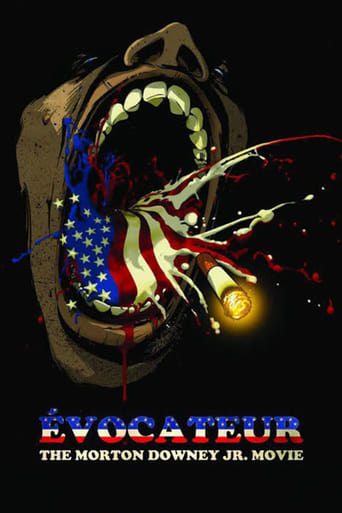

The Morton Downey Jr. Show blazed like an incendiary comet for about two years on television in the late 1980's only to crash and burn due to the all-too-human flaws and foibles of its exceptionally crude, rude, and abrasive host Morton Downey Jr. Notorious for the ruthless way he ferociously bullied and berated guests that he disagreed with, Downey Jr. played the role of the angry and abusive ultra-conservative right-wing wacko to the deliciously slimy hilt. Naturally, it was basically all a cunning and calculated act, but Downey Jr. still managed to achieve significant iconic status with a huge segment of the disenfranchised American public as a kind of say-it-like-you see it blue collar folk hero. Born to show business parents (his mother was a dancer and his father was a famous singer), Downey Jr. initially made an abortive attempt to become a singer like his much-despised father before going on to work for the Kennedy family as a liberal senator (!) in the 1960's prior to recreating himself as a hostile Republican loudmouth rabble rouser in the 1980's.Fortunately, this documentary neither glorifies nor vilifies Downey Jr; instead it presents him warts'n'all as an extremely angry and insecure man whose fragile ego and continual desire for acceptance caused him to self-destruct in the most excruciatingly painful manner possible (Downey Jr. infamously staged an incident claiming that he had been attacked and brutalized by skinheads in an airport bathroom, which this documentary states for the record was an outright hoax concocted by Downey Jr. to get one of his wives to feel sorry for him). The clips from The Morton Downey Jr. Show are every bit as outrageous and hilarious as one would expect -- obnoxious gadfly Al Sharpton was knocked flat on his then fat pompous keister on one legendary episode which made the news -- while the latter footage of habitual chain smoker Downey Jr. transforming into a staunch anti-smoking advocate in the wake of being diagnosed with lung cancer registers as remarkably poignant and heart-wrenching. Mort's daughter Kelli Downey Cornwell and his best friend Lloyd Schoonmaker offer touching insights into the more human side of Mort while Chris Elliot, Sally Jessy Raphael, and Pat Buchanan discuss Downey Jr.'s legacy as a true trash TV pioneer who kicked politeness and civility out the door and replaced it with roaring rage and fury. Moreover, producer Bob Pittman admits he feels guilty about providing Mort with an ideal forum in which to bring about his own ruination while writer Jim Langan and bodyguard David Giegold tell some colorful stories about their wild ride working for Downey Jr. Although not without its flaws (for example, this documentary completely ignores the fact that Mort was a gay baiter who had a homosexual brother with AIDS who appeared as a guest on his show as well as glosses over Mort's subsequent career as an actor after his show went down the tubes), this documentary still overall sizes up as a fascinating chronicle of a singular 80's icon.
... View MoreSome people have accused me of being a loud punmouth, and I let it just be; I guess. Speaking of loudmouths, in the late 80's there was a loudmouth that came to instant fame in the form of Morton Downey Jr.; whose talk show was not really much a talk show but more of a forum to defend Americans' injustices in front of a national audience. Downey Jr.'s bullyish "in your face" style was resoundly controversial but it got in the ratings. However, this Downey Jr. did not eventually show that he was the "iron man" of talk television as his show was cancelled in just two years mostly due to his unconventional actions. Nevertheless, Downey Jr's thunderous style did pave the way to what we call today "reality show" programming; and that is for real. Downey Jr's rise and fall is captured effectively in the documentary "Evocateur: The Morton Downey Jr. Movie". It depicted Morton's madness, fervor, and resiliency in numerous arenas of his life with the primary emphasis being on his infamous show. So shut your mouth if you don't like this documentary, because I did!! Kidding! Just wanted to include some Mortonism in my review. So get your Morton motor running, and give this cool doc a try. **** Good
... View MoreActually, the storyline was about what you'd expect, told in an interesting manner. Each narrator had conflicting thoughts about this tortured man.The MDJ talk/insult show was a precursor to the brawls of today's reality shows. Downey also paved the way for the uncivilized anti-PC campaign of the 2000s. It was interesting to see Rev. Al Sharpton and Ron Paul making spectacles of themselves. What did they expect to happen? Or maybe that was the point. It is a fast track to celebrity status.I unexpectedly enjoyed the narrative of Pat Buchanan, especially his characterization of the Tea Party members. If you like documentaries, television, or reality TV, this is a good one to see.
... View MoreLike the other reviewer, I had never heard of this guy's show until this doc. I'd heard the name, but didn't know what it was associated with. Having seen this I can only say I wish it had more insights into WHY he's the man he is. It comes across as more summary than commentary, and that's always a shame to see in a documentary.He didn't innovate anything, as we find out that they were just copying the format of an old 1960s show, so no points for him there either. With that gone Downey Jr is just another angry middle aged man ranting on TV against people who can't actually change anything anyway. Just like it still is, it was all about the ratings more than the content.All in all, an entertaining movie for a mere budget of $300k, but could have been so much more...
... View More